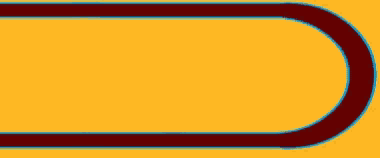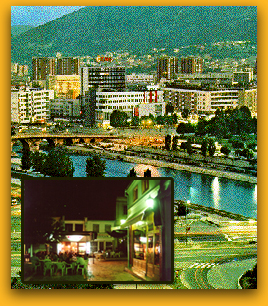
 |
 |
The
Mind of a Narcissist |
|
Frozen at an early morning hour, the stony hands of the giant, cracked
clock commemorate the horror. The earthquake that struck Skopje in 1963
has shattered not only its Byzantine decor, has demolished not merely
the narrow passageways of its Ottoman past, has transformed not only its
Habsburgian waterfront with its baroque National Theatre. The disastrous
reconstruction, supervised by a Japanese architect, has robbed it of its
soul. It has become a drab and sprawling socialist metropolis replete
with monumentally vainglorious buildings, now falling into decrepitude
and disrepair. The influx of destitute and simpleton villagers (which
more than quintupled Skopje's population) was crammed by central planners
with good intentions and avaricious nature into low-quality, hi-rise slums
in newly constructed "settlements." Skopje is a city of extremes. Its winter is harsh in shades of white
and grey. Its summer is naked and steamy and effulgent. It pulses throughout
the year in smoke-filled, foudroyant bars and dingy coffee-houses. Polydipsic
youths in migratory skeins, eager to be noted by their peers, young women
on the hunt, ageing man keen to be preyed upon, suburbanites in search
of recognition, gold chained mobsters surrounded by flaxen voluptuousness
- the cast of the watering holes of this potholed eruption of a city. The trash seems never to be collected here, the streets are perilously
punctured, policemen often substitute for dysfunctional traffic lights.
The Macedonians drive like the Italians, gesture like the Jews, dream
like the Russians, are obstinate like the Serbs, desirous like the French
and hospitable like the Bedouins. It is a magical concoction, coated in
the subversive patience and the aggressive passivity of the long oppressed.
There is the wisdom of fear itself in the eyes of the 600,000 inhabitants
of this landlocked, mountain-surrounded habitat. Never certain of their
future, still grappling with their identity, an air of "carpe diem"
with the most solemn religiosity of the devout. The past lives on and flows into the present seamlessly. People recount
the history of every stone, recite the antecedents of every man. They
grieve together, rejoice in common and envy en masse. A single organism
with many heads, it offers the comforts of assimilation and solidarity
and the horrors of violated privacy and bigotry. The people of this conurbation
may have left the village - but it never let them go. They are the opsimaths
of urbanism. Their rural roots are everywhere: in the division of the
city into tight-knit, local-patriotic "settlements." In the
traditional marriages and funerals. In the scarcity of divorces, despite
the desperate shortage in accommodation. In the asphyxiating but oddly
reassuring familiarity of faces, places, behaviour and beliefs, superstitions,
dreams and nightmares. Life in a distended tempo of birth and death and
in between. Skopje has it all - wide avenues with roaring traffic, the incommodious
alleys of the Old Town, the proper castle ruins (the Kale). It has a Turkish
Bridge, recently renovated out of its quaintness. It has a square with
Art Nouveau building in sepia hues. An incongruent digital clock atop
a regal edifice displayed the minutes to the millennium - and beyond.
It has been violated by American commerce in the form of three McDonald
restaurants, which the locals proceeded cheerfully to transform into snug
affairs. Stolid Greek supermarkets do not seem to disrupt the inveterate
tranquility of neighbourhood small grocers and their coruscant congeries
of variegated fruits and vegetables, spilling to the pavement. 1 2 |
|